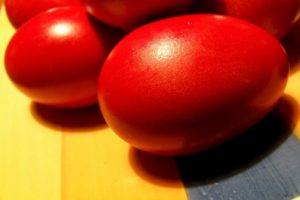 Easter is an important holiday in the Greek Orthodox religion. Itis a celebration of the death and resurrection of Christ and it also signifies the arrival of spring. The Lenten fast precedes Easter and there is a sense of celebration once the fast is over and the Greek people are able to celebrate Christ’s resurrection. There are a lot of traditions associated with Easter that are worth knowing. Here’s a look at some of the most common:
Easter is an important holiday in the Greek Orthodox religion. Itis a celebration of the death and resurrection of Christ and it also signifies the arrival of spring. The Lenten fast precedes Easter and there is a sense of celebration once the fast is over and the Greek people are able to celebrate Christ’s resurrection. There are a lot of traditions associated with Easter that are worth knowing. Here’s a look at some of the most common:
Tsoureki
On Thursday evening of Holy Week, preparations for the weekend begin with the baking of a sweet bread called tsoureki. This bread, with its braids and knots, goes back to pagan times when certain shapes were thought to ward off evil spirits. The three braids in the bread also represent the Holy Trinity. Tradition says that tsoureki symbolizes the resurrection of Christ as it is molded into shape and comes to life as bread. Eggs that are dyed red (symbolizing the blood of Christ) are often placed on top of the bread.
Good Friday
Good Friday is considered to be a solemn day in Greece. Flags fly at half-mast and thecontinuous sound of church bells can be heard ringingthroughout the day. In some villages,a shrine representing the tomb of Jesus is carried through the streets. This is a day full of devoutness and piety. In fact, in Greece there is also a tradition of people passing under the epitaphio, which is meant to represent their humility and acknowledging that by putting themselves beneath Jesus, he is a higher power. The somber mood is soon broken with singing and of course eating good food.
Midnight Church Service
On Holy Saturday evening, churches fill with parishioners attending the midnight resurrection service. At midnight, the lights of the churches go out and bells ring to announce the resurrection. The priest will light a candle representing Jesus’ eternal flame, and from this flame, everybody in attendance will light their own candle, illuminating the church to celebrate the resurrection of the Lord. Traditionally, once the church service has ended, people will try to keep their candles lit on their way home. Once they are in their homes, the light burns as long as possible and once it’s gone out, people make a black cross on their home with the burnt wick in order to bless the house. Outside of church, people light fireworks and set off firecrackers in celebration of the resurrection.
Red Eggs
In other countries, you may notice that eggs are dyed in a variety of colors to celebrate Easter. This isn’t the case in Greece because the preference is to dye eggs red to symbolize Jesus’s blood. When families return home from church early on Easter morning, they will crack the red eggs that were dyed. Everyone selects an egg and cracks it against another person’s egg. As they do this one will say “Christos Anesti,” which means “Christ has risen,” and the other will respond with “Alithos Anesti,” which means “Truly he has risen!” The winner is the last personremaining with an uncracked egg. Tradition says the winner will have good luck all year.
Magiritsa
Magiritsa is a traditional dish that is enjoyed early on Easter morning from church. It is typically eaten after the eggs are cracked. This dish is made of green vegetables (such as lettuce), onion, dill and the offal of the lamb. Offal is the entrails and internal organs that can be used as food. Eating magiritsa symbolizes the end of the 40-day fast Greek Orthodox participate in to mourn the death of Jesus.
Lamb
Before noon on Easter Sunday, families come together to roast the lamb and enjoy a lunch consisting of meat, potatoes, and salad. Jesus is referred to as the Lamb of God, but this is something that has a reference in the Old Testament. In one of the stories, Abraham was asked to sacrifice his son. When God saw he was willing to obey, he told him to stop, and Abraham sacrificed a lamb instead. Jesus became the sacrificial lamb when he died on the cross for our sins, and this fact is celebrated in the main course of the Easter meal.
The meaningful traditions of Greek Easter are not only important to the religion, but bring families and communities together for celebration and good food. There’s no doubt that Easter is the biggest holiday in Greece!